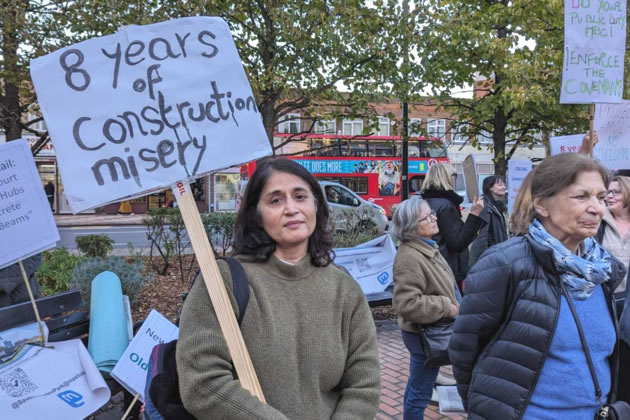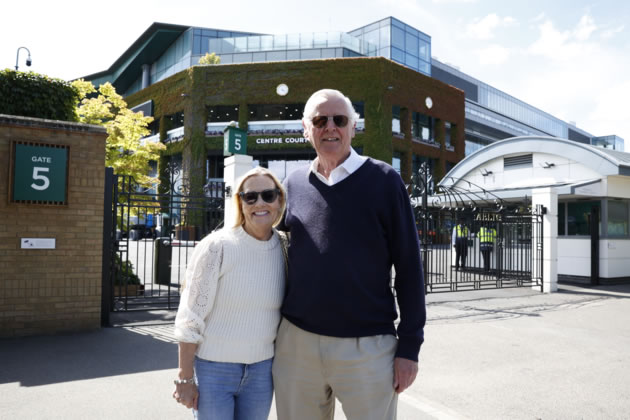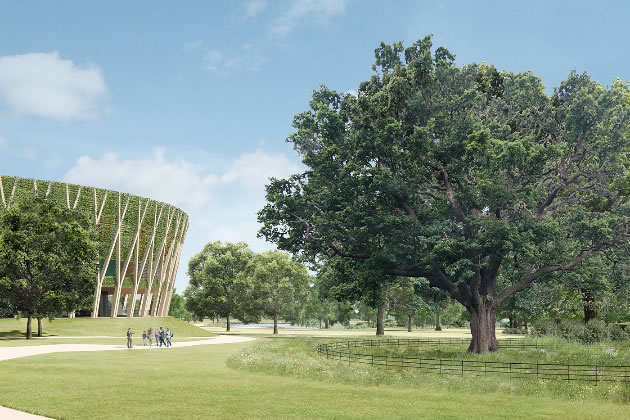Eight Years of Chaos Feared if Wimbledon Tennis Plan Proceeds
Opponents not against the sport but rather 44,000 lorry movements

A Wimbledon resident at a protest against the scheme. Picture: Harrison Galliven
August 20, 2024
“We’re not anti-tennis.†To anyone who has interacted with the Save Wimbledon Park (SWP) campaign, this will not be the first time you have heard this mantra.
The line is often used to preface the group’s many concerns about the All England Lawn Tennis Club’s (AELTC) plans to build an 8000-seater stadium on the grounds of an old golf club opposite the current championships site.
SWP have a multi-faceted argument against the plans, which take in concerns about the environment, access and the decision to build on Metropolitan Open Land, despite both Merton Council and AELTC’s prior agreement that they wouldn’t do that. However, there is another less technical but nonetheless impactful issue that binds them in their opposition.
The disruption caused by what AELTC predicts as at least eight years of building works and associated traffic always comes up as an issue, given the immense size of what they have planned for the area.
Along with building an 8,000-seat show court, 38 grass courts and 10 maintenance hubs on the site, the plans include a new public park spanning 9.4 hectares. The extra courts would allow AELTC to move the qualifying competition for the championships in Roehampton to the expanded site.
It would also host a new 14-and-under tournament and double the size of the wheelchair tennis tournament. AELTC has argued the scheme would safeguard the future of the championships in Wimbledon and make sure it “remains as the pre-eminent tennis tournament in the world and one of the most recognisable global sporting eventsâ€.
However, residents are less sanguine about AELTC’s vision. They have told the local democracy reporting service (LDRS) how the image of idyllic new grounds pales in comparison to what will be a daily grind of construction traffic and pollution.
Wimbledon resident Susan Cusack has helped lead SWP in their opposition to the plans. She told the LDRS how the scale of such a project would make locals suffer for perhaps the next decade.
She said, “The lorries will be required to remove every single inch of soil from the 73-acre site, we’re talking an enormous amount of disruption there. Think about how many lorries are going to be needed to manage that.â€
The SWP estimates that 44,400 more lorries would be needed to complete such a task. This would amount to up to 54 vehicles per day and one every 10 minutes from 8 am to 5 pm.
AELTC and the local authorities have already assigned a designated route that these lorries would take. However, SWP believes this route passes too close to areas of high concentration, and more often than not is along old and narrow roads.
Cusack added, “It’s especially bad around the village end of Church Road, where there is a row of listed little cottages that are really, really old and they literally shake when all these big lorries come past.â€

Susan Cusack with fellow Wimbledon resident Iain Simpson. Picture: Facundo Arrizabalaga
This is not just a concern of residents from the admittedly more upmarket end of the park in Wimbledon Village. Southfield residents have also expressed concerns about the increase in traffic on their roads.
Southfields father of one Alistair Grant told the LDRS, “If you look at the route they have chosen, it goes past the corner of my son’s school, St Michael’s School. Parents are up in arms about that.â€
Fellow resident Ruth Crabb told the LDRS how the narrow pavements along those roads meant she and her family were often put in danger by oncoming traffic. She said, “Even years ago when my girls were small, pushing them to school along the pavements in the buggy was hard work because of all the traffic. It’s just got bigger and bigger and bigger.â€
Along with the physical threat that the lorries would bring, SWP has also stressed the less visible pollution that would occur as a by-product of this hike in lorry traffic. Furthermore, many Merton residents have questioned their Council’s support for the plans, when the same Council declared a climate emergency back in 2019.
Cusack told the LDRS, “The roads will eventually break down because the weight of the cars and lorries are so heavy. The tarmac cannot take the weight over eight to ten years.â€
“From a pollution perspective, you have all the PM25 particles going into the air that are coming from the lorries’ tyres wearing down.
PM25 particles are fine inhalable particles, with diameters that are generally 2.5 micrometres and smaller. While they can come from many sources, fuel combustion and road tyre wear are two of the main emitters.
Cusack added, “There is no level of PM25 particles that are good for human health. So no matter how you look at it, the pollution is damaging to human health, and especially to young and old lungs.â€
Southfields resident and self-confessed tennis fan Margaret Newman runs an AirBnB business in the Wandsworth neighbourhood. She has also been very active in the SWP campaign and joined fellow group members in their public protest and outreach sessions during the most recent Championships fortnight.
Newman told the LDRS how public transport came up time and time again during her conversations with punters in the famous queue. Due to extensive road closures around the site, the vast majority of punters make their way to the championships via bus or the nearby Wimbledon and Southfields underground stations.
She described the experience of people using Southfields last month as a warning for the future. She told the LDRS: “This year was particularly bad with people being confined behind ropes at Southfields tube, in cattle-like fashion.â€
Cusack expanded on how the influx of extra punters coming through for the extended three-week championships could push the district line station to the limit. She said, “Southfields is a very small station, it’s on a crossroads and they don’t have any capacity to expand.
“In the AELTC plans they don’t even have any intention to expand the station, because they can’t. All they’ve said they’ll do is pay for more TfL staff at Southfields, but that doesn’t do anything to manage the numbers.
If you’re already having 10,000 people come through a day, a further 10,000 will be an absolute nightmare for the area. People in Southfields, and Wimbledon, to a lesser extent, who are trying to get into the stations to go to work and go about their everyday business will find it very difficult.â€
Bus users won’t be much better off, according to the SWP, as the extra lorry traffic would only further congest the narrow roads around the site. Newman told the LDRS how this congestion can have a very real impact on the elderly population in the area, who rely on public transport.
She said, “I’ve spoken to people who cancel appointments at St George’s during the Championships. This is because they can’t get there on a bus in a timely fashion.â€
The views of SWP have been championed by several local politicians, especially those in the Labour-run Wandsworth Council who voted to reject AELTC’s plans at a meeting in November last year. During that meeting, Conservative councillor Daniel Ghossain described the scale of the proposed development as “disproportionate and insensitive to the needs of residents and the environmentâ€.
Meanwhile, neighbouring Merton Council (also Labour-run) has been a backer of AELTC’s project, having chosen to approve plans at their meeting in October 2023. Despite the Council’s position, local MPs have been clear in their opposition to the proposals.
Putney’s Labour MP Fleur Anderson had shown clear support for SWP since the plans were first proposed, as did Wimbledon’s former Tory MP Stephen Hammond. During the recent general election, all of Wimbledon’s prospective candidates, from Paul Kohler of the Lib Dems to the Independent Amy Lynch, stood in objection to the plans.
Only Labour’s Eleanor Stringer failed to give a clear response, saying the proposals were “very complicated.†Kohler eventually won out in the battleground seat and made his support for SWP visible from the offset.
He told the LDRS, “I have been working with residents and community groups since 2021 to stop the All England Club from creating an industrial tennis complex on Wimbledon Park. As MP I will redouble my efforts to prevent the concreting over of this environmentally valuable piece of metropolitan open land.â€
The decision on whether the plans will go ahead now sits with Jules Pipe, Deputy Mayor for planning at the Mayor of London’s office. A decision is expected to be made later this year.
In the meantime, SWP members can still be seen campaigning around Wimbledon and Southfields in their distinctive green t-shirts. They are also encouraging people to sign their online petition, which currently has over 20,000 signatures.
Through their long campaign, members of SWP have been keen to stress that they aren’t “anti-tennisâ€. In reality, this means they appreciate the benefits that the championships bring and can deal with the negatives if they stay in their current form.
However, many of them see the plans as an example of “corporate greed†and incompatible with what the area really needs. Kish Modasia, who lives on Home Park Road opposite the entrance to the park, encapsulated the views of the group when she spoke to the LDRS this week.
Modasia said, “The current site for tennis is sufficient for what is needed. To build such a huge complex for a few weeks a year makes no sense.â€

CGI of the completed scheme. Picture: AELTC
When approached for comment, a spokesperson from AELTC said, “Our proposals will deliver one of the greatest sporting transformations in London since the 2012 Olympics.
“The proposals have been meticulously planned to minimise disruption to residents. Even on the busiest days of construction, the number of lorries accessing our site will be less than half the number of 493 buses travelling on Church Road on a daily basis.
“As part of the planning application, we have submitted extensive analysis and evaluation on construction-related traffic on Granville Road / Wimbledon Park Road, which will increase by just 0.5% as a result of the construction phase.
“We know that residents are excited at the prospect of 27 acres of newly accessible parkland that forms a core part of the transformation of the former golf course and we look forward to the GLA’s public hearing on the plans in due course.â€
A spokesperson for the London Borough of Merton said: “The Greater London Authority is currently considering the planning application submitted to us and to the London Borough of Wandsworth by the All England Lawn Tennis Club to expand and we await the outcome of their decision.
“The planning application includes an outline plan for construction logistics and appropriate planning conditions to address this issue. If planning permission is granted by the Mayor
of London, the applicant would be required to draw up detailed plans, with their contractor(s) for each phase, including arrangements for construction traffic to travel to and from the site.
“Construction logistic plans are prepared by applicants with input from their appointed contractors. For long-term projects, such as the AELTC plans, there won’t always be contractors appointed at the time of planning permission; therefore it is usual practice to apply planning conditions to these plans to be developed and assessed for each phase of the project.
“The council works closely with the developers of all large scale projects to minimise the impact of building work on the community.â€
Noah Vickers - Local Democracy Reporter